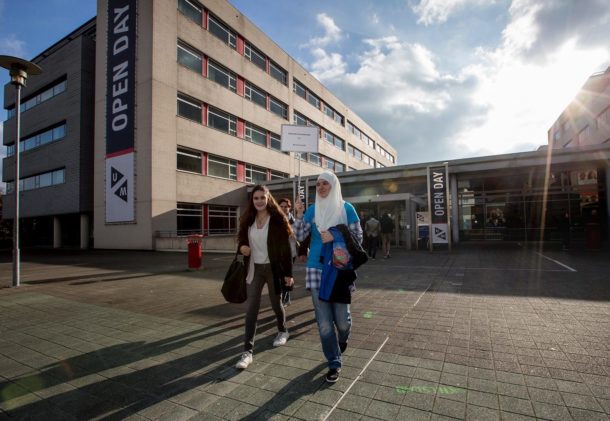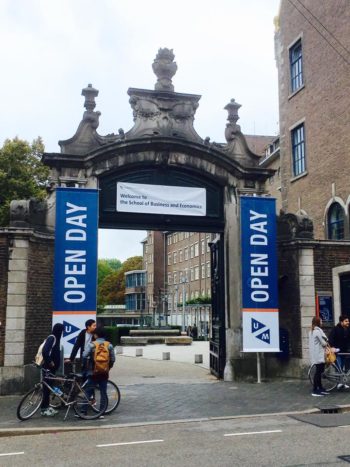

Maastricht University - UM (reviews)
Study at Maastricht University - UM
Maastricht University - UM ratings and description
Maastricht University – UM is a public university founded in 1976 and known as the second youngest of the thirteen Dutch universities. Currently, they have more than 16,000 students and more than 3,000 Academic and Administrative staff. Most of their Bachelor’s programme is in English and still offering traditional programme and has an honours Liberal Arts College.Show more
FREQUENTLY ASKED QUESTIONS ABOUT Maastricht University
Based on the EDUopinions rankings, the Maastricht University rating is 4.0. If you want to know more about this school, read the student reviews on our website.
The Maastricht University offers courses related to the fields:
- Economics
- Social Policy
- History
- Performing Arts
- Management
Maastricht University Campuses are located in:
- Maastricht, The Netherlands
The universities similar to Maastricht University are:
Studies with verified reviews
30 Student Reviews
-
Data Management1 month ago
 StudentDKConcerned Instructors and Counselors
StudentDKConcerned Instructors and CounselorsI have witnessed scenarios in the Maastricht University where students excel in certain courses while facing challenges in others. In such instances, instructors and counselors step in to address these discrepancies and assist the students in achieving a more balanced academic outcome. By offering targeted support and guidance, the university aims to nurture the emotional well-being of its students and ensure their holistic development. This personalized approach to education underscores the institution’s dedication to fostering a supportive and inclusive learning environment where students can thrive and reach their full potential.
View moreProgramme: Data ManagementDegree: Bachelor'sGraduation: 2027Delivery Type: On CampusCampus: Maastricht -
Economics and ...10 months ago
 StudentEconomics Course
StudentEconomics CoursePretty badly organized for first year students and a very high failing rate as you can only fail 2 out of 12 classes, which is pretty outrageous as in an exam you need per example a 27/40 to pass the class.
View more
Problem based learning seemed exciting but it was a totally disappointing learning method for most of the classes like qm1, qm2 and more. 8 year suspension from tje uni is also outrageous. Pick your study with careful considerationProgramme: Economics and Business EconomicsDegree: Bachelor'sGraduation: 2023Delivery Type: On CampusCampus: Maastricht -
BSc Psychology02 Mar, 2023
 StudentTHThe best research based psychology bachelors!
StudentTHThe best research based psychology bachelors!UM embraces diversity of their students, keeping a high standard of research based education. UM offers multidisciplinary approach to education, with an emphasis on problem based learning to allow students to become leaders of their own learning. With highly accomplished and published researchers as course coordinators aided with group tutors, students are ensured to recovered the most enriched and inclusive education within whatever field. The inclusivity of English and Dutch courses allows Maastricht University to cultivate a rich academic environment allowing it to become the top university for several courses. Interested? Join UM on our open days or check out the summer school programmes to get a taste of life in Maastricht!
View moreProgramme: BSc PsychologyDegree: Bachelor'sGraduation: 2023Delivery Type: BlendedCampus: Maastricht -
Global Studies12 Jul, 2022
 StudentBrand New Global Studies Program in Netherlands
StudentBrand New Global Studies Program in NetherlandsThe program is indeed international, with most of the students coming from Western Europe (rather than all around the globe).
Students of this program are worldly, educated, and driven to be change-makers in the world. The professors in my experience are knowledgeable, helpful and good-natured. I like the problem-based learning style that the university is famous for, and the class material is very stimulating, interdisciplinary and relevant to the modern world.
The foreign language track of the program is pretty bad, with classes being only online and just once a week. The program is in its second-ever year so some of the structure of the program and the Skills track have some kinks and need to be reworked.In the local town, Maastricht, those from a city bigger than a village will most likely find it underwhelming. It’s usually pretty expensive, and finding housing is as impossible as most of the Netherlands and the local Dutch population is reasonably hostile to international students.
View moreProgramme: Global StudiesDegree: Bachelor'sGraduation: 2024Delivery Type: BlendedCampus: Maastricht -
European Studies30 Apr, 2022
 StudentProblem-Based Learning
StudentProblem-Based LearningOne of the most advertised features of the university, it is very pressuring and does not deliver the promised results – everything still has to be learned in the same manner as everywhere else – but here no tutorials are to be missed and PBL is supposed to be a key to successful graduation. Doing twice the work, therefore dividing the attention and time resources, without other options for students struggling with this method – then you are on your own.
View moreProgramme: European StudiesDegree: Bachelor'sGraduation: 2023Delivery Type: On CampusCampus: Maastricht





























